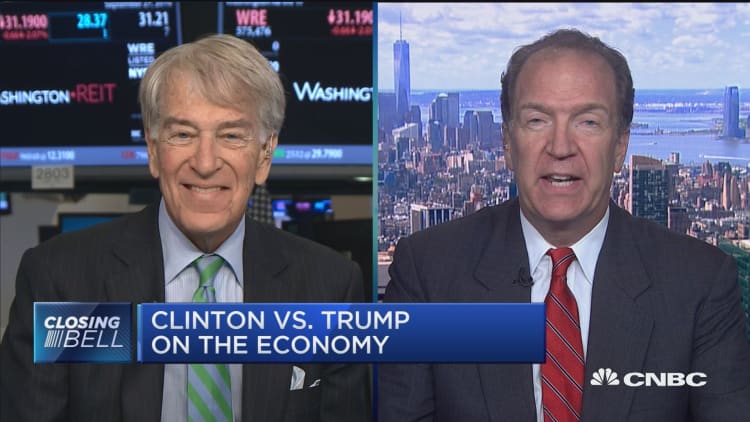
Hillary Clinton and Donald Trump took shots at each other over the economy during the first presidential debate, but experts disagreed about who came out on top.
Taxes, trade and regulation all came up during the often fiery discussion Monday night, but not too many details were revealed about each candidate's plan.
For David Malpass, president of Encima Global and a senior economic advisor to Trump, the Republican was the clear winner.
"What he did right up front was to make clear that he wants change and she doesn't. He wants a reform plan that will cause 4 percent growth, 25 million jobs. That you can achieve through tax reform, trade reform, regulatory reform and energy reform," he said in an interview with CNBC's "Closing Bell" Tuesday.
Meanwhile, Hillary Clinton wants higher taxes, which will not work to create more growth, added Malpass, who has worked in both the Reagan and George H.W. Bush administrations.
Hillary Clinton supporter Roger Altman, executive chairman and founder of Evercore, believes the Democratic candidate won the debate.
Altman, who served as Deputy Treasury Secretary under President Bill Clinton, said the focus of Hillary Clinton's plan is the middle class.
"We've had on the one hand a decent recovery over the past several years, but incomes are just now beginning to really move up," he told "Closing Bell."
Clinton wants to implement the largest infrastructure program since World War ll, get more people to complete college and make it easier for women to work by instituting paid leave and higher minimum wage, Altman noted.
However, Malpass countered that "a whole bunch of programs" don't add to the growth rate and said the 2 percent recovery the U.S. has had on average over the last seven years is inadequate.
He believes Trump's change in policy can boost the growth rate, and pointed to the successes during the Reagan and first Bush administrations, which had 8 percent and 7 percent growth respectively.
But Altman thinks a return to Republican economic policies is not the way to go.
"The last time the Republicans held the White House, we had the worst financial crisis since the '30s and the worst recession since the '30s. Now as a result of all those headwinds created by that, we're now beginning to climb out of it," he said. "Now the argument is let's go back to the policies which sank the country in the first place. Give me a break."


